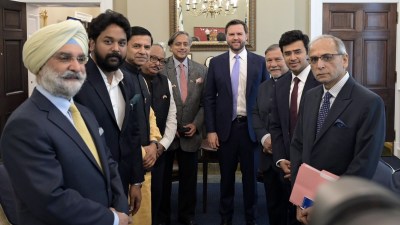Ranjeetji, What are you saying sitting there? If you talk about women’s issue seriously, be serious, please
Sumitra Mahajan, Lok Sabha Speaker, to Congress’s Ranjeet Ranjan during a calling attention motion on the increase in the prices of life saving drugs
SPEAKER OF THE DAY
Ranjeet Ranjan, Congress
I want to ask that how many many people in this House have travelled in an e-rickshaw? Has anybody sat in one? I have sat in one…my children have sat in one. That’s why I decided that I will not let my children travel in an
e-rickshaw
Said while trying to highlight how unsafe e-rickshaws are during a discussion to amend the Motor Vehicles Act.
INTERJECTION
Mayawati, BSP chief
The House has not been functioning for the last several days and the issue which has led to the deadlock is very serious. At the moment, the atmosphere of religious conversions through coercion and allurement that has been created in many states, particularly in Uttar Pradesh, can lead to communal tension. I want to request the Prime Minister that in the interest of the people and the nation he should reply without making it a prestige issue
Said to Prime Minister Narendra Modi over the impasse in the House
WATCHING
Prime Minister
Present: In Rajya Sabha during Question Hour. Said nothing.
Sonia Gandhi
Not present: Admitted to a hospital in the evening.
Rahul Gandhi
Not present
Manmohan Singh
Present: Said nothing.
DEBATE
Story continues below this ad
The Rajya Sabha continued to be in a logjam with the Opposition demanding the PM’s reply on a debate on religious conversions. There were multiple adjournments. The Lok Sabha passed the Motor Vehicles (Amendment) Bill, 2014, that seeks to enable operators of e-rickshaws to have licences.
5 Questions | Varun Gandhi, BJP
On calling for a middle path with regard to drug prices by keeping the interests of pharmaceutical industry and patients in mind and inviting Opposition’s ire for stating that its not the age of Fabian Socialism during a motion on increase in prices of life saving drugs and prevalence of spurious drugs.
You spoke on the increase in the prices of life saving drugs. What point were you trying to raise?
I wanted to highlight the relationship between drug pricing, innovation and availability, particularly for a country with significant systemic healthcare issues. The House should have an informed debate on this, utilising the scale of our problems to devise incentives that help bring down the cost of medicine, particularly for life saving drugs. Access and equity remain significantly divergent in India’s states.
Story continues below this ad
Do you agree with the contention that drug prices have gone up after the new government came in?
An oft-repeated misinformation runs the risk of being taken as the truth, and that seems to be the dictum for the Opposition of late. Drug prices have not gone up after the new government has come in. Example of anti-cancer drug Glivec (Novartis) and its generic version by Natco is quoted repeatedly, however, statements by the manufacturers and industry bodies categorically deny any price rise.
You said instead of price vs control and affordability vs availability, it can be both. Why did you suggest so?
When we speak of any aspect in an A vs B manner, we risk not being open to creating synergies to forge a win-win situation. Hence, a zero-sum-game line of thinking will not lead us to the optimal solution. We have successful delivery models like the Tamil Nadu Medical Services Corporation (TNMSC) which have proved that drug prices can be affordable and accessible at the same time.
Story continues below this ad
The opposition feels that you were trying to respond to their concerns and did not raise any questions.
It is important to understand the moot point of the discussion in the first place. The discussion was not meant to respond to their concerns and get involved in an exchange of questions and counter-questions. The fulcrum of the discussion was the need to have an informed discussion on the broader aspect of drug pricing and availability and the forward strategy to be adopted.
There were allegations that you spoke for the pharmaceutical firms and did not express any concern for the plight of the people. Your comments.
I would like to state that public good remains the foremost priority, it cannot be compromised. However, the public need for accessible, affordable and quality drugs can be realised better in harmony with a healthy pharmaceutical industry. Indian pharma market can grow to realise the ultimate objective of public good and play a bigger role in India’s aim for universal healthcare.








